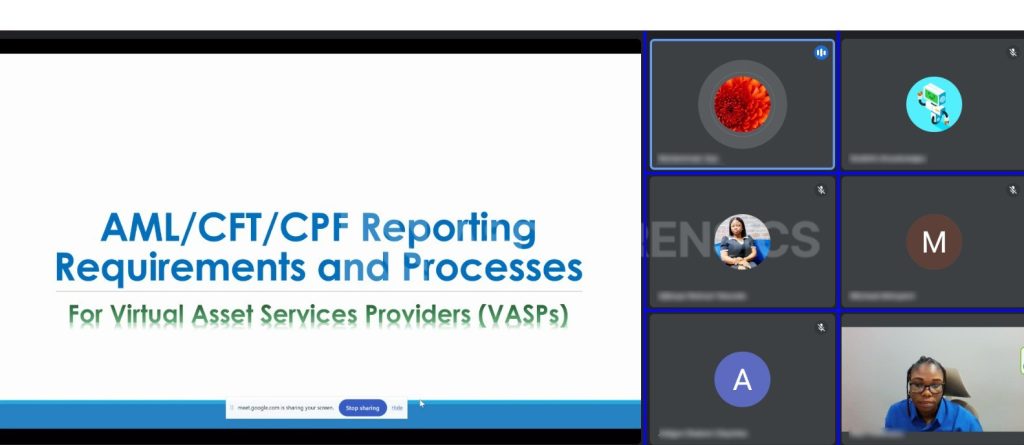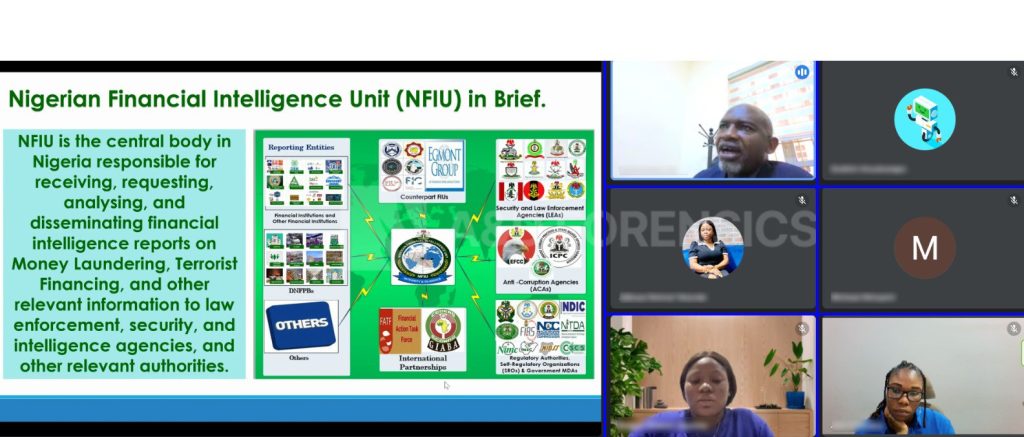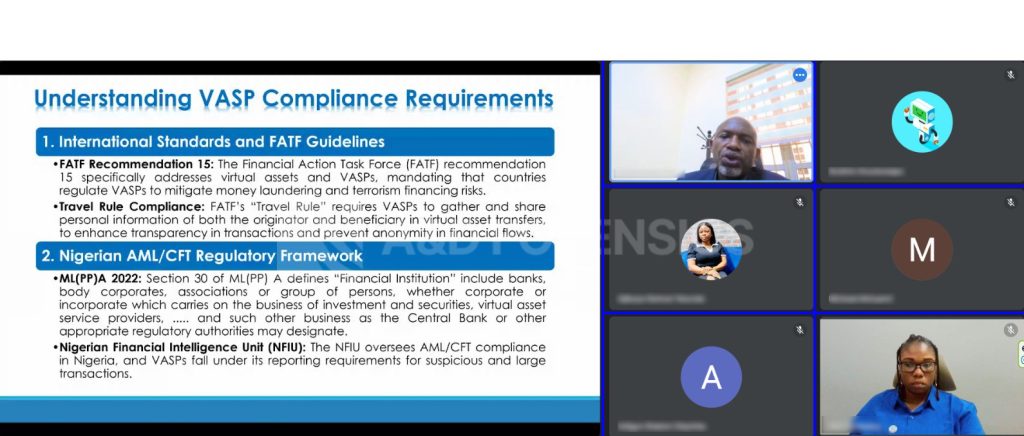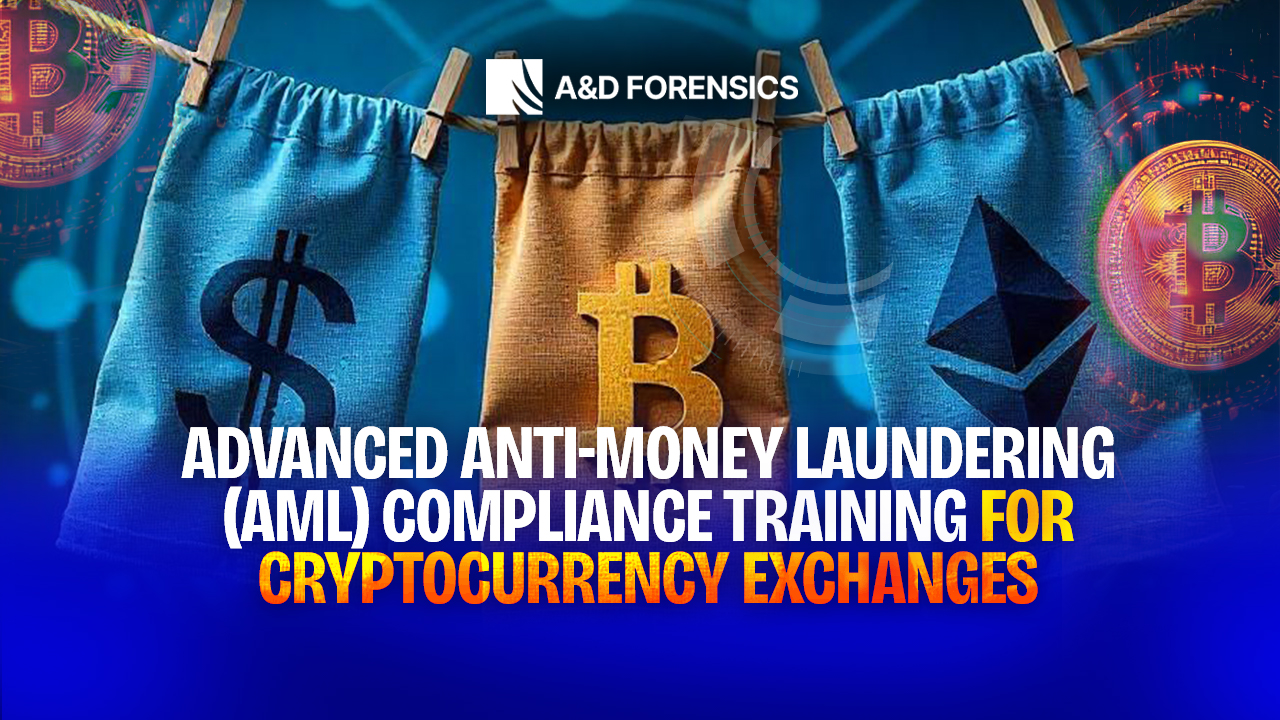Advanced Anti-Money Laundering (AML) compliance training is a critical regulatory requirement for addressing the inherent risks and crimes associated with cryptocurrencies within crypto exchanges. Some of these crimes, introduced by the rapid rise of cryptocurrencies and blockchain technology, include money laundering, fraud, terrorism financing, and ransomware financing. Therefore, Web3 startups, Virtual Asset Service Providers (VASPs), and cryptocurrency exchanges must stay updated on effective strategies to mitigate these crimes through regular Anti-Money Laundering (AML) training programs.
In view of the above, A&D Forensics recently conducted a one-day virtual training on Advanced Anti-Money Laundering Training for Roqqu Exchange. The training helped participants enhance their skills, stay updated on the latest trends in crypto-related crimes, and develop best practices for their in-house compliance teams.

Overview of the Advanced Anti-Money Laundering Compliance Training.
The one-day virtual training on advanced Anti-Money Laundering compliance and financial crime prevention, conducted online in a structured three-hour session, offered a comprehensive understanding of the regulatory, compliance, and operational frameworks critical for VASPs in Africa. It highlighted the important role VASPs play in preventing illicit activities within the cryptocurrency ecosystem, focusing on real-world scenarios and jurisdictional challenges.
To ensure compliance with the reporting standards of the Nigerian jurisdiction, the training provided in-depth insights from the Nigerian Financial Intelligence Unit (NFIU). This session was led by Dr. Muhammad Jiya, the COO of Emerging Technologies and Innovations (ET&I) at the NFIU.

Dr. Jiya shared valuable insights on how Roqqu and other Virtual Asset Service Providers (VASPs) in Nigeria can fulfill their reporting obligations to the NFIU using GoAML. He detailed the reporting requirements and processes, including Suspicious Activity Reports (SARs), Suspicious Transaction Reports (STRs), and Currency Transaction Reports (CTRs). He also explained that VASPs are required to submit the NIL Reporting form when no suspicious activity or transaction is detected on their platforms.
Participants had the opportunity to ask questions and receive feedback during his session, making it highly interactive and informative.

Learning Outcomes of the Advanced Anti-Money Laundering (AML) Compliance Training.
At the end of the Advanced AML Compliance Training, participants gained the knowledge and skills to identify various types of financial crimes, including money laundering, fraud, and terrorist financing. They learned how cryptocurrency exchanges and wallet providers can unintentionally facilitate such crimes and explored effective measures to mitigate these risks.
The training provided participants with a comprehensive understanding of regulatory requirements and jurisdictional approaches relevant to Roqqu and other Virtual Asset Service Providers (VASPs). They were also equipped to navigate the global regulatory landscape by mastering key compliance obligations, including Anti-Money Laundering (AML), Know Your Customer (KYC), and Counter-Terrorism Financing (CTF) measures.
Additionally, participants acquired the ability to apply the fundamental pillars of BSA/AML/OFAC compliance specifically tailored for VASP teams, ensuring that they are well-prepared to meet the demands of an increasingly regulated industry.
The Importance of Advanced AML Compliance for Crypto Exchanges & VASPs.
Anti-Money Laundering (AML) training is typically required for Virtual Asset Service Providers (VASPs), crypto exchanges, and their employees as part of the Five Pillars of AML/CFT/BSA Compliance Programs. The other pillars of an AML compliance program include the designation of a compliance officer, the development of internal controls, processes, and procedures, performing customer due diligence, and conducting independent audits of the compliance program.
AML training regulations mandate that employees undergo training at least once annually to stay informed about updates to AML rules and regulations. Such training should include key topics like legal and regulatory obligations, identifying and preventing money laundering, and understanding reporting procedures and requirements. Adhering to these regulations is crucial for avoiding penalties and maintaining a robust AML compliance program.

As a Cryptocurrency Exchange, VASPs or Web 3 Platform, you can achieve AML Training compliance by leveraging A&D Forensics AML training programs which are targeted to meet regulatory standards and address the specific needs of your workforce. At A&D Forensics, we tailor the AML Compliance training to various roles within the organization ensuring employees are well-informed about their AML responsibilities, fostering a strong culture of compliance.
Testimonials and Insights from Roqqu Exchange Participants on the Advanced AML Compliance Training.
Some of the participants gave their feedback on the one-day virtual training on advanced AML compliance and financial crime prevention.
Among the participants, Akinyemi Michael Oluwaseun, compliance and anti-fraud officer, stated that the training provided a deeper understanding of advanced AML concepts, focusing on effective ways to detect and prevent financial crime. He plans to enhance transaction monitoring and refine KYC/AML procedures for proactive risk management, appreciating the practical case studies and interactive sessions.
Ajiboye Roimot Yetunde, compliance officer at Roqqu, highlighted that the training was insightful and practical, offering clear explanations of complex AML concepts. She aims to improve AML compliance processes and risk assessment strategies, valuing the real-world insights from the case studies and the interactive nature of the sessions.
Shalom Olayinka Adigun, compliance and anti-fraud officer, expressed that the training provided a comprehensive understanding of advanced AML concepts, which will help in better detecting and preventing financial crimes. She plans to apply improved transaction monitoring and optimize KYC/AML processes to strengthen risk management.
Conclusion
To ensure compliance with Anti-Money Laundering (AML) training requirements, cryptocurrency exchanges, VASPs, and financial institutions must prioritize regularly training their employees and properly documenting such training to maintain accountability with regulators.
A&D Forensics is dedicated to supporting your cryptocurrency exchange, VASP, or Web3 start-up platform in Africa with advanced AML compliance and financial crime prevention training. This ensures you stay at the forefront of innovation while effectively mitigating risks.
Send us a message here to get started with training for you and your team.
Contributor:
Ibrahim Anuoluwapo Azeez






